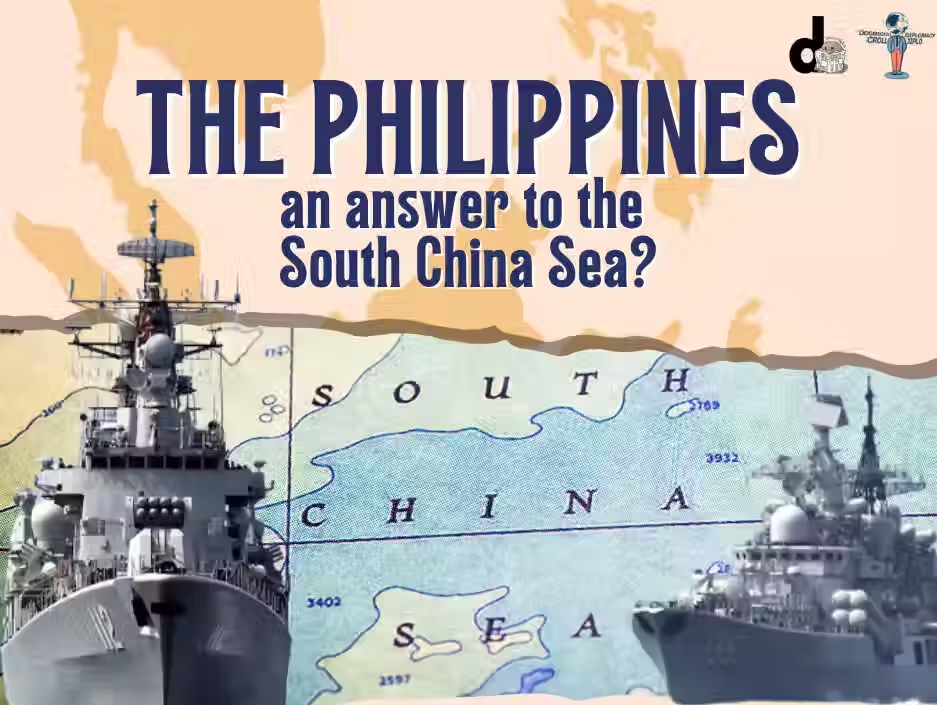No Immunity for Impunity: ICC Prosecutor v Duterte
- Discuss Diglett

- May 26, 2025
- 12 min read
Updated: Jul 24, 2025
This article is co-authored by Cathleen Ong and Luo Xuhong.
Cover image by Edden Chew.
Few in Manila on the morning of March 11 would have anticipated the events that were about to unfold later that day. Well, except those in the upper echelons of President Ferdinand Marcos Jr’s government. It seemed like a well-oiled operation planned in advance: as 16th President (2016-22) Rodrigo Duterte landed in the Filipino capital after a brief trip to Hong Kong, he was swiftly taken into custody.

Hours later, he was on a private jet bound for the Hague, the result of the execution of an International Criminal Court (ICC) arrest warrant against him on multiple charges of crimes against humanity for his self-declared war on drugs during his tenure as Davao City mayor and later on as Philippines President.
Duterte's Charges
Duterte is accused of committing crimes against humanity of murder under article 7(1)(a) and crimes against humanity of torture and rape under articles 7(1)(f) and 7(1)(g) allegedly committed in the Philippines between 1 November 2011 and 16 March 2019
For a man who has unabashedly claimed credit for the bloody campaign which, by some estimates, has left up to 30,000 dead, the long arm of the law may have finally caught up with him. Just over a year ago, justice for the slain was thought to be next to impossible - Duterte ordered the withdrawal of the Philippines from ICC jurisdiction in 2018 and his successor Marcos Jr has repeatedly emphasised a policy of non-cooperation with the ICC probe.
What led to this drastic about-turn? More importantly, can the ICC deliver long-delayed justice?
The License to Kill
ICC charges stem from the “Davao Death Squads” that first flourished during Duterte’s tenure as Davao City mayor. The macabre term referred to a group of vigilantes paid by local officials to keep the streets drug-free using whatever means available. This translated into summary executions of mostly petty drug dealers and casual users under the guise of targeting wanted criminals that allegedly resisted arrest.
Members were protected by the Davao government and granted immunity from any criminal responsibility. When Duterte became President in 2016, this brutal policy was extended nationwide (mostly across the capital city Manila and its surrounding suburbs) and state-sanctioned killings became increasingly rampant even amidst growing outcry.

When Marcos Jr. took office in 2022, he pledged a halt to the bloody campaign. Yet, he did essentially nothing to expedite investigations into possible abuses committed by his predecessor's forces. In fact, the ICC resumed its own probe in 2023 after expressing its dissatisfaction at the Philippines’ own investigations.
“A threat to our sovereignty. Will not lift a finger to help any (ICC) investigation”. Marcos Jr., Jan 2024. Source
A Political Ploy
Marcos Jr appears to have a change of mind. At the heart of this intriguing development is a tale of political undercurrents. The story goes back to 2022, when the Duterte and Marcos families form an alliance to win the 2022 Philippine general election in a landslide victory with Marcos Jr running as president and Duterte’s daughter Sara as VP.
However, cracks in the alliance soon showed: Sara Duterte was given control of the education ministry instead of the defense ministry while Duterte and Marcos publicly accused each other of being drug addicts. The rift worsened in end-24 as Sara Duterte was impeached by the House allegations of corruption and most bizarrely, her claims to have hired a hitman on Marcos Jr. If convicted by the Senate in a hearing scheduled for later this year, Sara Duterte will be barred from holding office, thereby ending her ambitions to run for President in 2028.
As the political feud escalated beyond control, Marcos Jr confirmed his policy u-turn in November 2024. Manila was now obliged to comply with any potential ICC warrant naming Duterte, foreshadowing the former president’s fate. This raises a graver subject about the ICC’s impartiality – their collaboration with Philippine authorities in effecting Duterte’s arrest. The implicit connection existing between the two bodies should ring alarm bells if it hasn’t yet. Though the international body has sworn by oath to be accountable and a fair executor of the rule of law, its actions in the Philippines spell a different story. There is a possibility that the ICC has become selectively used to remove unpopular choices when convenient, elucidating its partiality. This proves a troubling reality, especially for an institution intending to be a neutral arbiter of justice.
An additional issue up for contention is whether the ICC, in Duterte’s arrest, had invoked the principle of complementarity lawfully. According to Article 17 of the Rome Statute, the ICC can only prosecute or investigate when national jurisdictions are “unwilling or unable to genuinely carry them out”. Supporters of Duterte, including Philippine Senators Jinggoy Estrada and Robin C. Padilla, hold that the Philippines has a strong and independent judicial system which can uphold a fair sentence. In a debate in 2023, the two figures emphasised how the war on drugs had been thoroughly investigated by the Department of Justice and the Philippine National Police-Internal Affairs Service.
However, on paper, current investigations fail to look into the roles of high-ranking officials, which are the most responsible for planning and implementing Operation Tokhang. Furthermore, the existence of a statutory mechanism does not preclude having a genuinely functioning mechanism. Therefore, an absence of proper investigation warrants an intervention by the ICC, fulfilling the principle of complementarity’s objectives – fairness and accountability.
This is supplemented by strong public support in the country. A March 2024 survey involving more than 1,700 Filipinos revealed that nearly three in five approved of the investigations on the ICC. This begs a fundamental question – did Marcos Jr. strike the iron hot, and capitalise on a shift in opinion to advance his political motives? Still, it is noteworthy that readers have to reconcile the limited role played by domestic politics in the ICC.
The ICC has the preconditions for a fair trial fulfilled, but whether it is a similar case in reality is contemplated in the next section.
A fair trial?
Detractors claim that Duterte was treated inhumanely post arrest, implying that he was exposed to prejudiced conditions. They maintain that he was denied proper medical care despite multiple requests. Beyond being treated equitably, a broader point of contention swells around the legality of Duterte’s arrest.
In Article 127(2) of the Rome Statute, it is sworn that a country’s withdrawal from the treaty does not influence obligations which arose prior to it. The ICC posits that regardless of the principle of compartmentality, they should be legally able to hear Duterte. However, this fails to acknowledge that the obligation is only applicable towards a state, and not an individual of it, as held in Pangilinan et al. v. Cayetano et al. (G.R. No. 238875, 2021).
A more dire lapse lies in how international arrest warrants must comply with local laws. In the case of People v. Salazar (G.R. No. 174452, 2012), it was reaffirmed that arrests without warrants in the Philippines were illegal.
This is with the exception of two clauses outlined in Rule 113, Section 5 of the Rules of Criminal Procedure which are in hot pursuit or flagrante delicto. Since Duterte was neither a fleeing suspect or caught red-handed, in theory, his arrest is illegal.
Section 17 of Republic Act No. 9851, or the (Philippine Act on Crimes Against International Humanitarian Law, Genocide, and Other Crimes Against Humanity) further foregrounds this. The act postulates that subservience to international law is to be viewed as discretionary, instead of mandatory.
This is in line with the Supreme Court’s stance that domestic jurisdiction retains precedence if national sovereignty is at stake. The stand was reinforced in Magallona v. Ermita (G.R. No. 187167, 2011). However, it is highly disputable that Duterte’s arrest constitutes a breach of national sovereignty.
There is dissent however, surrounding the ICC’s ability to prove that Duterte had committed this crime beyond a reasonable doubt. First and foremostly, the ICC must showcase that civilians had experienced a systematic, and widespread attack. Duterte’s operation had not, at least prima facie, intended to murder innocent individuals. Even if police officers had engaged in abuses themselves, such crime was not executed on an organised basis. Hence, they should be prosecuted domestically, and should not necessitate intervention.
The ICC’s perceived lack of impartiality is exacerbated by its inconsistent approach to other cases. For example, when allegations were raised in Thailand’s drug war under Thaksin and Colombia’s counter-narcotics-campaign, they were unprosecuted due to the recognition that drug enforcement remained within the boundaries of state sovereignty.
Secondly, the aforementioned nature of the crimes suggest that they were committed in silos, and should be viewed as isolated cases instead of international crime against humanity. Lastly, the arrest of Duterte marks the first case where anti-drug operations are prosecuted.
With multiple lapses highlighting the inequitable application of legal precedent, the legality of Duterte’s arrest has been called into question. Whether Duterte’s arrest goes beyond being biased politically, but also in nature now comes to the forefront.
ICC and diplomacy
A glance at the ICC’s statistics over its 20-odd years of history isn’t particularly inspiring - of the 60 arrest warrants issued since 2002, only 21 suspects have been detained and another 31 are still at large. On paper at least, all 125 parties to the Rome Statute are supposed to execute warrants issued by the ICC (including those issued against heads of state) and cooperate fully with ICC investigations. Geopolitical reality has meant that this is far from the case in practice.





Comments